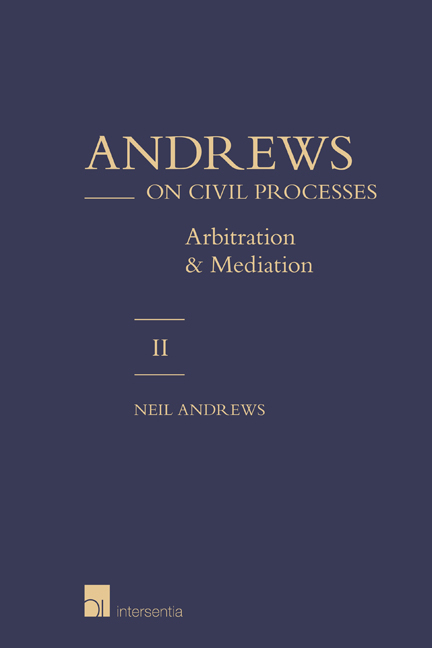Book contents
- Frontmatter
- Dedication
- CONTENTS VOLUME I
- Contents
- Table of Cases
- Table of Statutes
- Table of Statutory Instruments
- PART I MEDIATION
- PART II ARBITRATION
- Chapter 3 Commercial Arbitration: What Is It and Why Choose It?
- Chapter 4 The Major Principles of Arbitration and Litigation: A Comparison
- Chapter 5 Fundamental Features of English Arbitration
- Chapter 6 ‘The Seat’ and the Range of Relevant Laws
- Chapter 7 ‘Arbitrability’: Public Policy Limitations upon the Scope of Arbitration
- Chapter 8 A Confidential Process
- Chapter 9 Arbitration Agreements
- Chapter 10 Courts Giving Effect to Arbitration Agreements
- Chapter 11 Commencement of the Submission and Time Issues
- Chapter 12 The Tribunal's Appointment, Tenure and Immunity
- Chapter 13 Pre-Hearing Proceedings
- Chapter 14 The Hearing
- Chapter 15 Final Remedies, the Award, and Correction of the Award by the Tribunal
- Chapter 16 Fees, Expenses and Recoverable Costs
- Chapter 17 Arbitration Awards: Issues of Finality and Res Judicata
- Chapter 18 Challenges to English Arbitral Awards under English Law
- Chapter 19 English Enforcement of English Awards
- Chapter 20 Enforcement under the New York Convention (1958)
- PART III CONSUMER ADR
- Select Bibliography
- Index to Volumes I and II
Chapter 18 - Challenges to English Arbitral Awards under English Law
from PART II - ARBITRATION
Published online by Cambridge University Press: 13 December 2017
- Frontmatter
- Dedication
- CONTENTS VOLUME I
- Contents
- Table of Cases
- Table of Statutes
- Table of Statutory Instruments
- PART I MEDIATION
- PART II ARBITRATION
- Chapter 3 Commercial Arbitration: What Is It and Why Choose It?
- Chapter 4 The Major Principles of Arbitration and Litigation: A Comparison
- Chapter 5 Fundamental Features of English Arbitration
- Chapter 6 ‘The Seat’ and the Range of Relevant Laws
- Chapter 7 ‘Arbitrability’: Public Policy Limitations upon the Scope of Arbitration
- Chapter 8 A Confidential Process
- Chapter 9 Arbitration Agreements
- Chapter 10 Courts Giving Effect to Arbitration Agreements
- Chapter 11 Commencement of the Submission and Time Issues
- Chapter 12 The Tribunal's Appointment, Tenure and Immunity
- Chapter 13 Pre-Hearing Proceedings
- Chapter 14 The Hearing
- Chapter 15 Final Remedies, the Award, and Correction of the Award by the Tribunal
- Chapter 16 Fees, Expenses and Recoverable Costs
- Chapter 17 Arbitration Awards: Issues of Finality and Res Judicata
- Chapter 18 Challenges to English Arbitral Awards under English Law
- Chapter 19 English Enforcement of English Awards
- Chapter 20 Enforcement under the New York Convention (1958)
- PART III CONSUMER ADR
- Select Bibliography
- Index to Volumes I and II
Summary
GENERAL POINTS CONCERNING CHALLENGES UNDER THE 1996 ACT (SECTIONS 67, 68 AND 69)
THE THREE GROUNDS OF CHALLENGE IN OUTLINE
There is a ground of challenge before the High Court (Commercial Court: 24.01 ff, vol I) based on (i) lack of jurisdiction (section 67, Arbitration Act 1996: 18.19 ff), or (ii) the assertion that the arbitral panel has been guilty of ‘serious irregularity affecting the tribunal, the proceedings or the award’ (section 68, 1996 Act: 18.41 ff), or (iii) on the basis of an error of (English) law (section 69, 1996 Act: 18.67 ff).
Ground (iii), under section 69, can be excluded by agreement (18.95 ff).
But grounds (i) and (ii) are mandatory: they cannot be excluded by party agreement.
Permission to appeal, under sections 67–69, from the High Court to the Court of Appeal can only be given by the High Court itself, unless (i) the High Court decision was made outside the court's jurisdiction, or (ii) consideration of the issue of permission involved an unfair process, or (iii) there is a preliminary issue whether section 69 applies at all or whether the parties have excluded it. The reason for exception (iii) is this: ‘there is a distinction between those cases where the court is assisting or overseeing the arbitration process and the cases where the question is whether the jurisdiction of the court has been excluded.’
The policy of the law is to lean against second appeals from arbitration decisions, that is, from the High Court and then to the Court of Appeal. That policy was noted in the Itochu case (2012), the Amec case (2011), and earlier in the Sukuman case (2007), where Waller LJ said:
‘[The Arbitration Act 1996 contains] many sections in which the right to appeal to the Court of Appeal is circumscribed by the necessity to obtain leave from “the court” at first instance. This was important to those drafting the Arbitration Act 1996 (England and Wales). It was the intention of those drafting the Arbitration Act 1996 (England and Wales) to limit appeals to the Court of Appeal to avoid the delay and expense that such appeals can cause.
- Type
- Chapter
- Information
- Andrews on Civil ProcessesArbitration and Mediation, pp. 331 - 372Publisher: IntersentiaPrint publication year: 2013



